Camp Lejeune Water Contamination
On August 10, 2022, President Biden signed the Honoring our PACT Act of 2022, which included the provisions of the Camp Lejeune Justice Act of 2022, into law. The new legislation will allow thousands of individuals who were exposed to contaminated water on the Camp Lejeune base to sue the government for damages.
The legislation will allow military and former military families to seek compensation despite the North Carolina statute of repose that previously limited the time period during which victims could bring an action against the federal government.
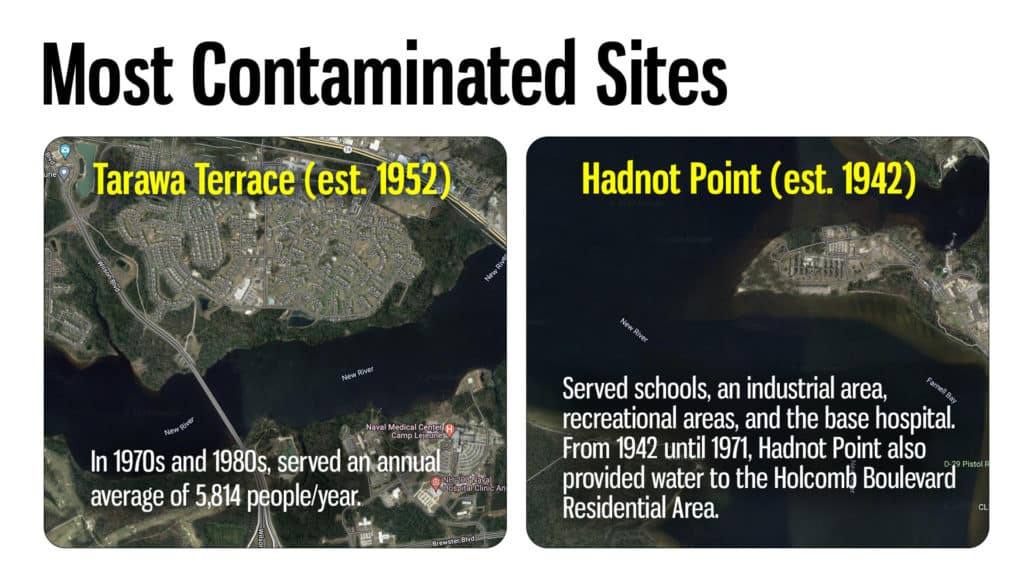
History
Camp Lejeune opened in 1942 as a Marine base in Jacksonville, North Carolina. In 1982, the Marine Corps discovered volatile organic compounds (VOCs) in drinking water provided by two treatment plants on base, according to the Agency for Toxic Substances and Disease Registry (ATSDR).
The ATSDR believes that exposure to these contaminants from the 1950s to February 1985 caused adverse health effects. In particular, the contamination may have exposed base residents to trichloroethylene (TCE), tetrachloroethylene (PCE), benzene, and vinyl chloride. These substances “likely increased the risk” for certain types of cancers, ATSDR said.
The two treatment plants with contaminated water were Tarawa Terrace and Hadnot Point. The source of contamination at Tarawa Terrace was ABC One-Hour Cleaners, an off-base dry cleaner.
In 1989, Camp Lejeune and the dry cleaners became EPA Superfund sites, according to ATSDR. Various sources, including leaking underground storage tanks, industrial area spills, and waste disposal sites, contaminated the supply wells at Hadnot Point, the ATSDR said.
The ATSDR conducted several studies beginning in the 1990s designed to determine the effects of the contamination, including reproductive studies, water modeling, and mortality studies.
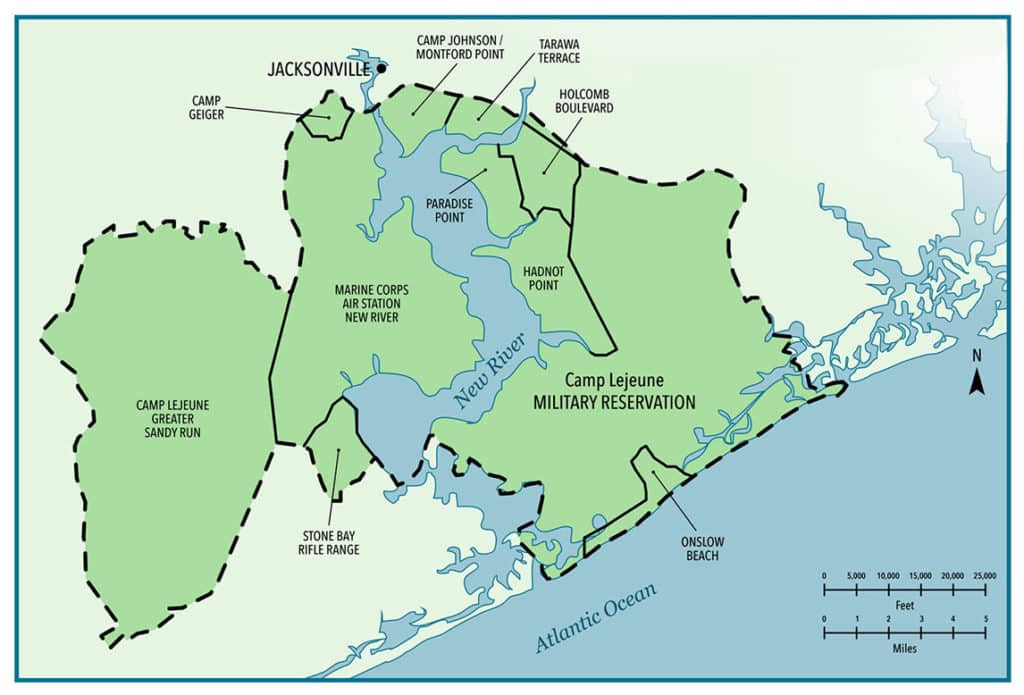
Health Effects of the Camp Lejuene Contamination
Based on studies with animals and workers who used similar chemicals in the workplace, the ATSDR concluded that the contamination could be causally linked to:
- Kidney cancer
- Non-Hodgkin lymphoma
- Cardiac defects
- Bladder cancer
- Leukemia
- Liver cancer
It also found links between the contamination and several other diseases, including:
- Multiple myeloma
- Parkinson’s disease
- End-stage renal disease
- Scleroderma
Some evidence also supports a link between the contamination and various birth abnormalities, neurological disorders, anemia, liver cirrhosis, and other cancers.
What compensation can victims receive?
Those who served on Camp Lejeune are already eligible for certain benefits based on the ATSDR scientific studies. The Veterans Administration has established a presumptive service connection for veterans who served on base between August 1, 1953, through December 31, 1987, who later developed one of the following:
- Leukemia
- Aplastic anemia and other myelodysplastic syndromes
- Bladder, liver, or kidney cancer
- Multiple myeloma
- Non-Hodgkin’s lymphoma
- Parkinson’s disease
The presumptive service connection means that veterans who served from August 1, 1953, to December 31, 1987, can receive all of their non-dental health care through VA hospitals and are eligible for disability compensation.
The Camp Lejeune Families Act of 2012 also provides for cost-free health care for those who served at Camp Lejeune for at least 30 days during the time of the contamination. The free health care is available for the following conditions:
- Cancer of the esophagus, breast, kidney, lung, or bladder
- Multiple myeloma
- Renal failure
- Female infertility
- Scleroderma
- Non-Hodgkin lymphoma
- Hepatic steatosis
- Myelodysplastic syndromes
- Miscarriage
- Neurobehavioral effects
- Esophageal cancer
How can your firm acquire a Camp Lejeune case?
Passage of the PACT Act opens the door for thousands of Marines and their families to file lawsuits in federal court for exposure to toxins in Camp Lejeune’s water supply.
Consumer Attorney Marketing Group is the largest integrated marketing agency dedicated to law firms. We provide everything your firm needs to gather convertible Camp Lejeune leads.
CAMG combines proprietary data and demographics to help you target your audience efficiently. Our strategic marketing team can help you develop a solid strategy to generate Camp Lejeune cases.
We also provide services to help you manage cases once you obtain them. We offer 24/7 phone intake services and a streamlined approach to contract signing, along with medical record retrieval and review. If you are interested in marketing for Camp Lejeune water contamination cases, contact us today.
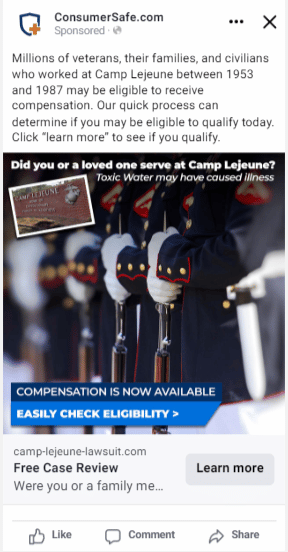

CAMG has thousands of spots and infomercials that can be branded for your firm. Reach out to us for the latest creative offline and online examples*.
*Examples shown are not always current examples.
Request Samples
* These fields are required.

Is your firm in the Top 3 of Google Search?

CAMG Ethics White Paper
Legal Areas
Are you looking for data-driven marketing for your law firm?
I have worked with CAMG for years. Not only are they great at delivering, but they are great people to work with!
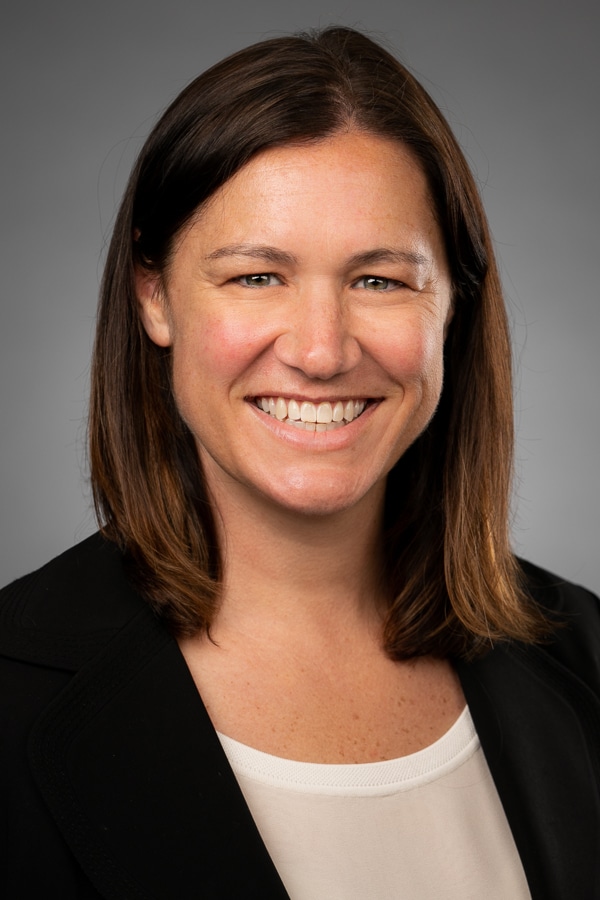
CAMG is always accommodating and willing to work in a way that supports your office as an extension of your team.

Steve Nober and the team at CAMG are responsive, ethical, talented, reasonably priced, and easy to work with!

If you are looking for professional, hardworking people who produce great results and then take you out for a nice dinner, look no further than CAMG
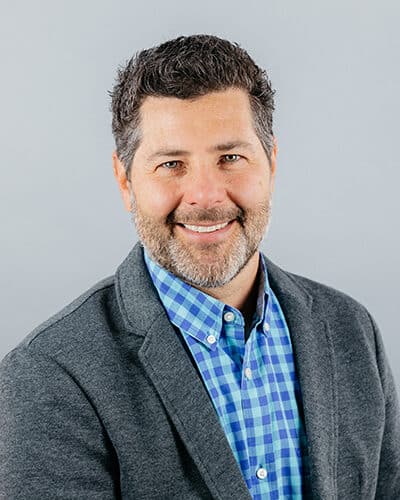

THE NATION’S LARGEST FULLY INTEGRATED
Marketing Agency Dedicated to Law Firms
- Television
- Radio
- Public Relations
- Medical Record Retrieval & Review
- Search Engine Optimization
- Paid Digital
- Out of Home
- Intake & Contracting Services
